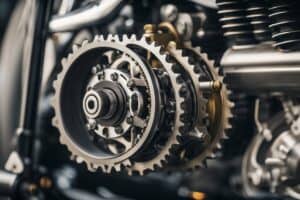Experiencing a hard front brake lever on your motorcycle can be both puzzling and alarming. It’s a common issue that riders face, but what’s actually causing it? From hydraulic problems to mechanical mishaps, the reasons vary.
Before you hit the road again, it’s crucial to understand the root of the problem. A stiff brake lever not only affects your ride’s comfort but can also compromise your safety. Let’s dive into the possible culprits and get your motorcycle braking smoothly once more.
Common Causes of a Hard Front Brake Lever
Experiencing a hard front brake lever on your motorcycle can often be traced back to a handful of common issues. Knowing what to look for is crucial for a quick diagnosis and solution.
Air in the Brake Lines
Air trapped in the brake lines can cause a spongy or stiff brake lever. Unlike brake fluid, air is compressible. This means every time you squeeze the lever, you’re compressing the air instead of applying pressure to the brake pads.
- Bleeding the brakes removes the air and restores proper function.
Contaminated Brake Fluid
Brake fluid absorbs moisture over time, leading to contamination. This can increase the fluid viscosity, resulting in a hard brake lever.
- Regular fluid changes, as recommended by your motorcycle manufacturer, can prevent this issue.
Corroded or Dirty Brake Components
Corrosion or dirt in the brake system, specifically around the pistons and caliper can lead to increased resistance.
- Cleaning and maintaining these components can alleviate the problem.
Over-tightened Adjusters
Adjusters set too tight might not allow for the small amount of free play needed for the brake lever to feel responsive.
- Ensuring proper adjustment as per your service manual is key.
Faulty Brake Hose
A deteriorated or poorly routed brake hose might restrict brake fluid flow.
- A thorough inspection and replacement if necessary should resolve the stiff lever issue.
Addressing these common causes typically restores the smooth operation of your motorcycle’s front brake lever, enhancing your control and safety on the road. Remember, regular maintenance is the best prevention against these issues.
Problem #1: Low Brake Fluid
When you’re dealing with a hard front brake lever, one of the first things to check is your motorcycle’s brake fluid level. Low brake fluid can be a direct link to increased lever stiffness. As fluid levels drop, air can be drawn into the system, reducing hydraulic pressure and making your lever feel unyieldingly solid.
Your brake system relies on a precise balance of fluid to transmit pressure effectively from the lever to the brake pads. As such, it’s crucial to maintain optimal fluid levels. If you notice the fluid is below the recommended mark on the reservoir, it’s time to top it off. Always use the type of brake fluid specified in your motorcycle’s owner manual to avoid compatibility issues which can compromise braking performance.
Keep in mind that a drop in brake fluid can sometimes indicate a leak. Paired with hard lever issues, a leak suggests a more severe problem. Visually inspect the entire brake system – from the master cylinder down to the brake calipers – to spot any signs of fluid leakage. If you find evidence of a leak, it’s essential to address it immediately. Riding with compromised brakes endangers not just your safety but that of others on the road.
Routinely checking your brake fluid shouldn’t just be a troubleshooting step—it’s a critical part of your bike’s maintenance schedule. Checking the level before each ride can save you from the headaches of unresponsive brakes and give you peace of mind during your travels.
Problem #2: Air in the Brake Lines
When you’re dealing with a front brake lever that’s harder to squeeze than usual, air in the brake lines is a common culprit. Unlike brake fluid, air is compressible, and when it’s in your brake lines, your lever will feel spongy and unresponsive before it becomes hard.
First, you’ll need to check if there’s air trapped in the lines. If you’ve just replaced your brake pads or fluid, or if your motorcycle has been unused for a while, these changes could introduce air into the system. The solution is to bleed your brakes, a process that forces air bubbles out of the brake lines, restoring the hydraulic pressure.
Here’s how to pinpoint air in your lines:
- You might hear a clicking noise from the caliper area.
- The lever may initially feel soft before getting stiff.
- Response times when applying the brake could become longer.
Bleeding your brakes is straightforward but requires careful attention:
- Secure your motorcycle on a stand to prevent it from tilting.
- Locate the bleed nipple on the brake caliper.
- Connect a clear hose to the nipple and place the other end in a container to catch the brake fluid.
- Gently squeeze the brake lever, open the nipple to release air and fluid, then close it before releasing the lever.
- Repeat this process until no air bubbles appear in the fluid exiting the nipple.
Regular maintenance is crucial for brake performance. You should bleed your brakes at least once a year or anytime you suspect air entrapment. Keep your bike’s performance at its peak and ensure your safety by eliminating air from the brake lines promptly.
Problem #3: Worn Brake Pads
When you’re tackling stubborn motorcycle issues, worn brake pads may be the culprits behind a hard front brake lever. Brake pads are vital components in the braking system, and over time, they naturally wear down. This wear can lead to increased distance between the brake pads and the disc, requiring more lever force to achieve the same braking effect.
Identifying worn brake pads is straightforward:
- Check the thickness of the pads. Manufacturers typically recommend a minimum thickness.
- Look for uneven wear or damage such as cracks or glazing.
- Listen for squealing or scraping sounds during braking, which often indicates that pads need replacement.
Replacing brake pads is a regular maintenance task that you can do to help prevent a stiff brake lever. Ensure you choose quality replacements that match your riding style and bike type. Proper installation is crucial for safety; if you’re unsure, it’s wise to consult a professional.
Remember, maintaining optimal brake performance isn’t just about comfort, it’s about your safety on the road. Regular checks and timely replacement of worn pads keep your brake system responsive and reliable, enabling you to enjoy your rides with peace of mind.
Problem #4: Sticking Brake Caliper Pistons
When you’re out riding, you might notice your front brake lever feels unusually hard, and it could be due to sticking brake caliper pistons. This is more than just an annoyance—it can compromise your motorcycle’s braking efficiency. The pistons in the brake caliper are supposed to glide smoothly within their housing, allowing the brake pads to apply and release even pressure on the rotor. However, if these pistons stick, they fail to retract properly, causing persistent pressure and a hard lever feel.
Why do pistons stick? Over time, dirt, debris, and corrosion can build-up, hampering piston movement. If your bike’s been stored in a damp environment or it’s been a while since the last brake service, you’re at a higher risk for this issue.
To diagnose sticky pistons:
- Look for fluid leaks around the piston area.
- Check if the brake pads are wearing unevenly.
- Attempt to retract the pistons with a proper tool after removing the brake pads; they should move back smoothly.
Routine maintenance, such as cleaning the pistons and using fresh brake fluid, goes a long way to prevent sticking. If cleaning doesn’t resolve the sticking, it may be time to consider having the calipers overhauled or replaced. Remember, your braking system is vital for your safety, so don’t ignore any signs of sticky pistons.
How Can I Prevent my Motorcycle’s Disc Brake from Warping?
To prevent motorcycle disc brake warping causes, it’s important to avoid harsh braking, which can generate excessive heat and lead to warping. Regular maintenance, including checking for worn brake pads and ensuring proper wheel alignment, can also help prevent disc brake warping.
Problem #5: Warped Brake Rotors
If you’re experiencing a hard front brake lever, another culprit to consider is warped brake rotors. These discs should be perfectly flat to allow for smooth braking. However, exposure to high heat and pressure can cause them to deform, leading to inconsistent contact with the brake pads.
When rotors warp, your brake pads can’t clamp down evenly, which can make your brake lever feel unusually firm. You’ll want to check for rotor runout – a term used to describe the amount of wobble in the rotor when the wheel spins. This is best done with a dial indicator, but a visible inspection can sometimes reveal severe warping.
Ensure that your rotors are within the manufacturer’s recommended tolerance for runout. If they’re not, they might be causing your hard brake lever issue. Rotors can be resurfaced in some cases, but if they are too thin or warped beyond repair, replacement will be your safest bet.
Warped rotors can happen due to:
- Prolonged heavy braking
- Sudden temperature changes
- Improper installation torque on the rotor bolts
If you suspect your rotors are to blame, it’s best to address the issue promptly. Riding with warped rotors can lead to uneven brake pad wear and compromised braking performance, which is a risk you shouldn’t take on the road.
Frequently Asked Questions
What can cause a hard front brake lever on motorcycles?
A hard front brake lever can be caused by sticking brake caliper pistons or warped brake rotors, which lead to inconsistent contact with the brake pads and require immediate attention.
How do warped brake rotors affect motorcycle braking?
Warped brake rotors cause the brake pads to contact the rotor unevenly, which can result in a firm brake lever and can also lead to uneven brake pad wear and potentially compromised braking performance.
What is rotor runout, and why is it important?
Rotor runout is the measure of how much the rotor deviates from a perfect spin when rotating. Checking for rotor runout helps determine if the rotors are warped, which is crucial for maintaining optimal braking performance.
What should be done if the rotors are found to be warped?
If the motorcycle’s brake rotors are found to be warped, they need to be repaired or, more commonly, replaced to ensure the braking system functions correctly.
Is it safe to ride with a hard brake lever issue?
Riding with a hard front brake lever can be unsafe as it indicates a problem with the braking system. Promptly addressing the issue is crucial for rider safety.
As an Amazon Associate we earn from qualifying purchases.










